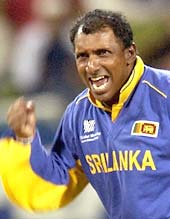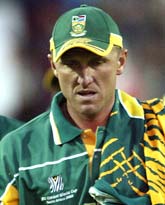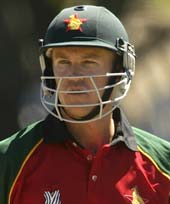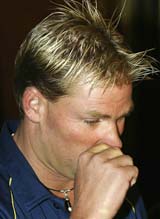Home > Cricket > World Cup 2003 > News > Report
Big names forced to call time
Tony Lawrence |
March 24, 2003 19:05 IST
World Cups always herald a changing of the guard but the 2003 edition was different in that so many top-of-the-range players departed against their will.  Aravinda de Silva, the third highest run-scorer in one-day history and one of the game's greats, was the exception.
Aravinda de Silva, the third highest run-scorer in one-day history and one of the game's greats, was the exception.
Sri Lanka thanked him for two decades of distinguished service by allowing him to stage-manage his good-bye.
He graciously stepped down after losing to Australia in the semi-finals.
Few others were treated with such respect.
The South African selectors were particularly trenchant.
Perhaps keen to emulate Australia's well-documented ruthlessness in regenerating their team, they did not even wait until the end of the tournament before bringing out the knives.
 Ageing fast bowler Allan Donald, the only South African to take 300 Test wickets and rated by cricket bible Wisden as the second-best one-day bowler of all time, was unceremoniously dropped during the first phase of the tournament as the hosts crashed out early. Wincing, he retired.
Ageing fast bowler Allan Donald, the only South African to take 300 Test wickets and rated by cricket bible Wisden as the second-best one-day bowler of all time, was unceremoniously dropped during the first phase of the tournament as the hosts crashed out early. Wincing, he retired.
By then, fielder extraordinaire Jonty Rhodes had been dropped from the squad after breaking a finger. His plea to be retained in the squad and given time to heal -- Australia fielded Damien Martyn in the final with a broken finger and he rewarded them with 88 not out -- went unheard and Rhodes also called time on his international career.
Shaun Pollock, meanwhile, was sacked as captain even before the finalists had been decided. He said he had not been given enough support but vowed to soldier on in the ranks.
Pakistan's 36-year-old Wasim Akram, like Donald, was expected to bow out gracefully after the World Cup but he, too, allowed the selectors to get there before him.
He became the first man to reach 500 one-day wickets but, having failed to announce the end of a glittering career after the team's first-round exit, he was sacked along with captain Waqar Younis and six other senior players. Wasim may never make it back.
Some managed to get their timing right by jumping just in time.
Pakistan coach Richard Pybus, reading his tea leaves correctly, had got out early.
Nasser Hussain did as well, as he stood down as England's one-day skipper after another less than glorious campaign.
Disgusted with the protracted fiasco surrounding England's decision to forfeit their match against Zimbabwe in Harare, he had already hinted he could quit. But he knew his days were numbered anyway, conceding: "I believe I don't warrant a place in the (one-day) side any more."
 Andy Flower, arguably Zimbabwe's greatest batsman ever, and Henry Olonga, the team's first black player, certainly decided their own destinies.
Andy Flower, arguably Zimbabwe's greatest batsman ever, and Henry Olonga, the team's first black player, certainly decided their own destinies.
Wearing black armbands during their side's opening World Cup match against Namibia to protest against what they saw as human rights abuses and "the death of democracy in our beloved Zimbabwe", they knew exactly what they were doing.
"I was never under the illusion that my stand would have no consequences," Olonga said.
Quickly disowned by President Robert Mugabe's government, Flower, one of only seven current international players with a Test average of over 50, was allowed to play on before he also said good-bye to the international game. His future now lies in England and Australia.
Olonga, meanwhile, who played just one more match after the protest, remained in hiding in South Africa while he mulled on his future.
Perhaps the biggest two casualties of South Africa 2003, however, failed to bowl a ball or hit a shot. Neither made the starting line, although for very different reasons.
Steve Waugh was not named in Australia's squad by the selectors and was thus deprived of defending the crown he helped win in 1999.
Some Australian newspapers had been scandalised by the decision. On Monday, their front pages were adorned with pictures of a new face, the smiling Ricky Ponting, Waugh's successor and the man of the match in Sunday's final against India.
 Shane Warne, meanwhile, was banned for 12 months by the Australian Cricket Board after failing a drugs test. He arrived in South Africa but had already packed as the team bus set off for the first match,.
Shane Warne, meanwhile, was banned for 12 months by the Australian Cricket Board after failing a drugs test. He arrived in South Africa but had already packed as the team bus set off for the first match,.
He said he had inadvertently taken diuretics in fluid-reduction pills to improve his appearance and proclaimed himself the victim of "anti-doping hysteria".
The must successful leg spinner of all time, he had already announced he would retire from on-dayers after the tournament. There could have been no worse way to go.